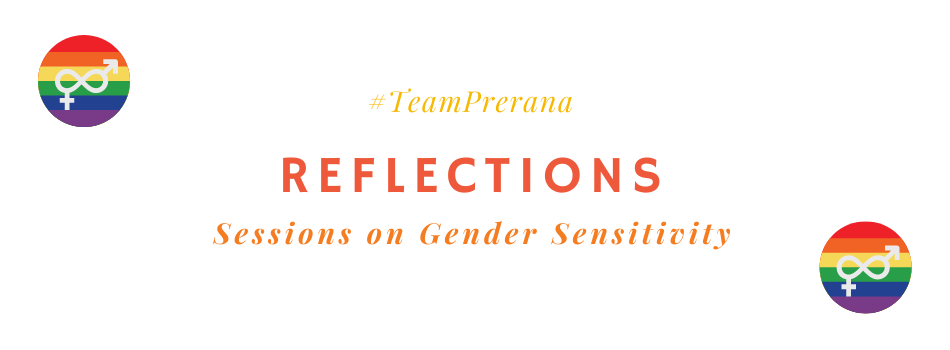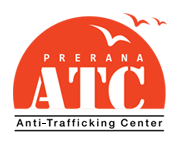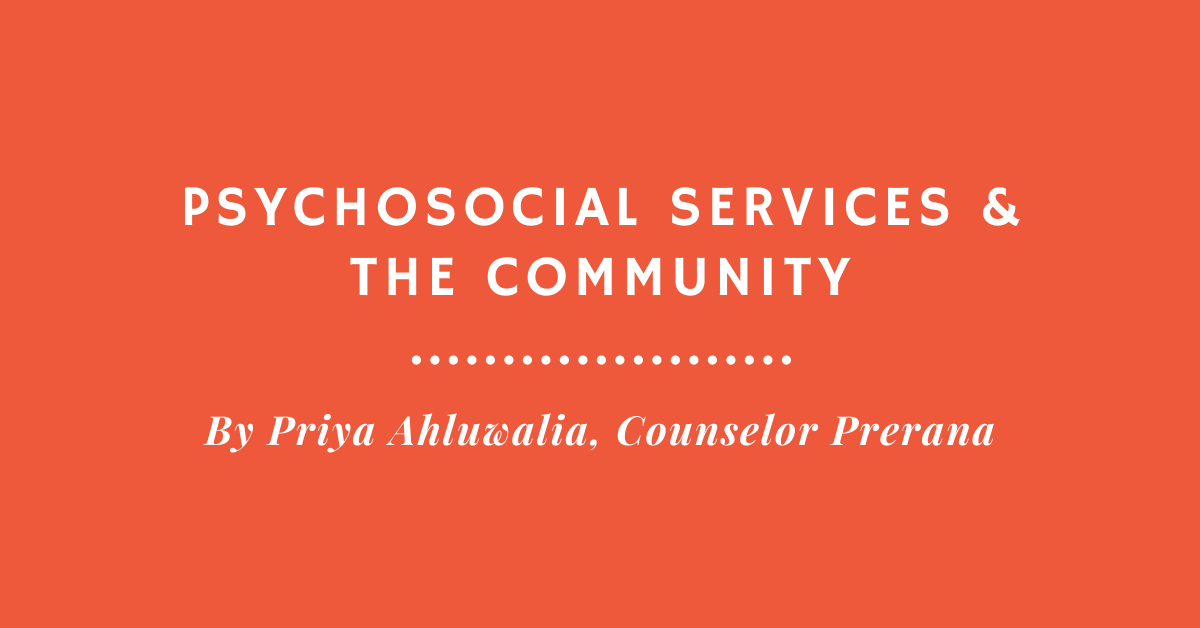
Reflections on Gender Sessions by Team Prerana
Azra Qaisar
DOCUMENTATION AND COMMUNICATIONS MANAGER
Since September 2019, Ms. Priya Ahluwalia and Ms. Azra Qaisar from Prerana’s ATC team, have been regularly conducting sessions on gender sensitivity with the Prerana Team. The objective was to gradually build an understanding of the various issues related to gender, and its manifestations, and to become more mindful of gender in our interventions. Some of the issues that have been covered are listed as under –
- Understanding Sex and Gender
- What is Patriarchy?
- Understanding and unpacking feminism
- What is Gender Identity?
- What is Sexual Orientation?
- Intersectionality
- What is justice? Who gets to access it?
Contemporary issues of gender like the impact of COVID-19 on women, the incident of ‘Bois Locker Room’, etc have also been covered in the sessions. Over the past few months, some of the discussions in the sessions have also steered to identifying issues of gender in casework interventions.
Given the engagement of the team for over ten months on the issue, it was important to evaluate if the sessions were useful, and how the team was employing them in their work. In 2020, through a series of feedback sessions, the utility/outcome of the discussions was gauged. The following are some of the responses received from the staff, about their reflections on the sessions –
ATC Team:
“I am gradually trying to shift my perspective on social issues. Earlier, I held the belief that women could choose to not be oppressed, and it is their situations that put them in their gender roles but now, I see how this is a part of their socialization. I understand that it may not be easy for women to take a stand, and hence acknowledge the complexity of the issue.”
– Kashina Kareem, Assistant Director (Prerana)
“The sessions have made me more mindful. In a recent case, I was working with a parent who did not feel that his daughter would be able to find a job and be independent, as compared to his son. Earlier, I would have left this matter at that, and not pursued it, thinking that the man must be rigid in his ways. Now, I tried to talk to him and make him understand that his daughter was no less than his son. This was my chance to further the goal of gender equality.”
– Aaheli Gupta, Casework Manager (Sentinel, ATC)
“I have begun to be more observant of things that I would not have noticed earlier. In one of my cases, I came across a situation where when we were providing relief to the family, they were hesitant to ask for sanitary napkins. The sessions have helped me build an understanding that alerted me to this being a problem. In another case that I was working on, the girl child was the primary caregiver in the family. Earlier, I might have left the issue, thinking that this is because she is the elder child and may not have observed the role of gender in the allocation of the responsibility to the child. However, reflecting on it now I understand that it was because she was a girl, therefore it was naturally assumed that she would take up the nurturing caregiver’s role in the family. Now, I am trying to help the family understand that they can divide some of the responsibilities to unburden the child. Apart from this, I have tried to make my documentation as gender-neutral as possible by using inclusive pronouns. If the same is not possible, I try to add a line stating that the document only refers to girls/women because that is the area of the particular intervention.”
– Rashmi Taylor, Casework Manager (Phoenix, ATC)
“I have been employing the ideas discussed in the sessions, in my BTE sessions and it has been useful in making the children understand about gender sensitivity. Due to the inhouse session conducted I could also conduct a few sessions on the basics of gender with the children.”
– Flarantxa Pereira, Project Coordinator (ATC)
“We are trying to encourage girls and women clients to empower themselves, like asking them to go to the Police Station, hospital, etc on their own. It is a process, more than working on the immediate outcome. A major challenge for me has been finding terms in Hindi to make the parents and children understand gender sensitivity better.
I also feel that, though I have attended limited sessions, they have helped me in grounding myself, and help me prevent from swaying into the ideas of the family or the child regarding gender, and thus, reinforce them. Recently, we had been working on a study where I thought that it was important to link gender with caste to better understand the vulnerabilities of a community.”
– Geetarani Lourembam, Senior Project Coordinator (Sentinel,ATC)
Sanmaan Team:
“The sessions have helped me understand the impact of language on our thinking. I try to use terms to be more aware of the gendered nature of language. For instance, I avoid words like ‘boy-cut or ‘tomboy’ in my documentation. In Sanmaan’s work, the communities stop sending the girls to schools once they start their menses, and we are also working to educate parents on letting the girls continue their education. This is a major challenge within our community. We also helped stop a case of child marriage, recently but it had to be undertaken covertly to avoid jeopardizing our relationship with the community, for future interventions.”
– Amrapali Mukherjee, Senior Project Manager (Sanmaan)
“I have tried to work on letting children be, and exploring who they want to be, and not be bound by their gender. Explaining to stakeholders in the communities is a challenge and takes time, but it is quite necessary. We have also undertaken discussions with the community emphasizing the importance of continuing education post-menarche. In a recent case of child marriage, we noticed that boys in the community were using these discussions as a way to discouraging the parents to stop the education of girls.”
– Deepali Mistry, Project Manager (Sanmaan)
“In our relief work in the Pardhi community during the covid pandemic, we observed that women would come to collect relief kits and ration but men would not. We have initiated a conversation with the community on how it is not just the job of women. Another major challenge for us has been destigmatizing male-female friendships. I have observed that a girl is often shamed for befriending boys, and that is something I would like to work on.”
– Hasina Sheikh, Project Coordinator (Sanmaan)
“We are working to help young girls, who live on the streets, understand how they can be safe. We don’t just state things but we explain our reasoning, to both the family and the child. Children like it when you explain the reason to them, and not just tell them to do something.
In the communities where Sanmaan works, we have observed that often young girls are helping the families earn but boys are playing around. While it is easier to communicate things to the family, making a whole community understand that their behavior is patriarchal and discriminatory is deeply challenging. The sessions have also helped me be open about menstrual health through discussions on shame being associated with female bodies. A major challenge for me remains to help the community understand these things, and also finding easier ways to break it down for them.”
– Sandhya Katkar, Project coordinator (Sanmaan)
“I have found it challenging to follow-up on girl children amidst the lockdown. When a male social worker calls the family, it takes a lot of effort to make them understand that we are calling in the best interest of the child, as social workers, and not to trouble their daughter. This challenge does not occur when I follow up in the presence of female social workers, on the field but navigating it through the lockdown is a little hard.”
– Mahesh Billu, Sanmaan
NCC Team:
“The sessions have helped me in being more aware of my biases, at work and at home. It is a challenge as many of these ideas have been internalized but I try to be more conscious. Within our interventions also, I have attempted to make mothers understand how to divide household chores between the children, and not only expect the girl child to help. I also think the post-Covid19 situation will bring many challenges that will require a gendered lens in the interventions. There is a possibility that the education of girl children will not be prioritized in families. Within the red-light areas, I don’t see finances being an issue as most children study in Municipal schools but I do sense a risk of mothers pawning their girl children if they are too indebted.”
– Mugdha Dandekar, Project Head (NCC)
“I am working with a girl child who is interested in physical activities so I suggested to the child to consider joining the police force as a career option. The child’s first reaction was that police work was a masculine field. I asked her to not look at career options through a gendered lens, and pursue what would interest her. The child was also intrigued by the discussion, and then shared about how she had also seen a strong woman police officer in a recent film. Apart from this, I often encourage people to use the word ‘homemaker’ instead of ‘housewife’, as housework is work too. Another thing that I have gradually learned is to be comfortable with openly discussing issues of menstrual health in front of my male counterparts. Since the male members also attend the sessions, it makes it easier to communicate and makes me less hesitant from within me.”
– Pinky Singh, Project Coordinator (IPP)
“In our NCC interventions, we have been conscious of gender for a long time, and are now increasingly trying to make the mothers in the RLA understand that they are the key decision-makers in the lives of their children. We are working to make the mothers understand how the men (their fancymen, intimate partners) are not constant figures, hence they must mention their names in all their documents and also consider mentioning their names in the documents of their children and also keep all documentation in their name.
The discussion on ‘Bois locker room’ in April was helpful in understanding a relevant issue that I was not aware of. One thing I feel is that we often see girl children as vulnerable but tend to not see young boys as that vulnerable to sexual abuse. I think this needs to be thought over.”
– Aruna Katkar, Project Manager (NCC)
“We have always worked to treat boys and girls equally but now we encourage girls to take more leadership roles.”
– Vaishali Karande, Outreach worker (NCC)
“We try to make mixed groups of both boys and girls in NCC activities. If earlier we thought that let us make groups exclusively of boys and girls, we would have avoided doing so.”
– Reehan Mirza (Boys NCC)
We are working to make mothers understand how to be consistent regarding the details of the paternal figure in their child’s lives. We are trying to build an awareness of how women are also the decision-makers in the lives of their children.
– Jyoti S (NCC)
“I have refrained from calling any girl ‘tomboy’ and acknowledged that she is just expressing herself through her clothes. I have also shared some reflections of the sessions with my husband, and it has been a learning experience for both of us. In a recent case, a child had to medical terminate her pregnancy. She was a victim of sexual abuse, and constantly kept asking why she had to go through so much pain. The people in the community had also blamed her mother for not keeping the child safe. I feel making children and their families understand that abuse was not their fault, and helping them move away from victim-blaming is a challenge.”
– Prachi Naik, Project Manager (IPP)
“Many of the issues that have been discussed in the sessions have reminded me of my own experiences growing up, and have been very relatable. Being a woman social worker affected me once when I went to follow-up in a Boys’ Home run by a voluntary organization. As I work with an organization that works with victims of trafficking and women in the sex trade, I could feel a sense of moral judgment on part of the authorities. They were also taken aback when I did not act timid or submissive and sought details of the children in a professional manner but I did my job as was expected of me. Yet, situations like these remain challenging.”
– Rahima (IPP)
“I have never been comfortable in interacting with members of the opposite sex. Ever since I was a child, I have preferred to have female friends only but sometimes my work requires me to interact with men. It does not come naturally to me but gradually I am gaining that confidence. It remains challenging for me but I am trying my best, and more discussions on navigating such situations would be helpful.”
– Nilima Pawar (NCC)
“The sessions are helping get more clarity on discrimination and also on what the society has decided to be masculine or feminine. My conceptual clarity is slowly getting better.”
– Sheetal Jadhav (NCC)
“While working in one of the Prerana centers, an effeminate child was referred for counseling. The child liked to wear a bindi or drape a dupatta around himself. Many children in the center would make fun of him and I observed that the staff at the center were also concerned by his behavior. In counseling, I tried to accept the child’s behavior as a part of who they are. Simultaneously I held discussions with the staff members to understand their concerns and encouraged them to be more accepting. Initially, the staff was slightly hesitant to accept the new idea, however, after a few discussions, it seemed they were becoming more understanding. Thus regular discussions on gender play an important role in bringing a gradual shift in people’s behavior.”
– Shruti Chaterjee (Counselor, NCC)
Naunihal Home for Girls:
“There is a greater consciousness towards the issues of gender. A lot of things are brought to our attention but I believe we need to examine the intersections of class and caste more.”
– Kavita Thorat, Probation Officer (Naunihal Home for Girls)
“I have tried to consciously stop using terms like ‘boy-cut, and use gender-neutral terms like ‘haircut’. Recently we were watching a film where both the male and female characters had body hair. I observed that the girls reacted with disgust seeing the female character’s body hair, indicating a gender bias. I spoke to them about how the hair was a part of our bodies and must not be perceived as unnatural.”
– Madhuri Shinde, Superintendent (Naunihal Home for Girls)
“I believe change cannot happen overnight, and it takes a long time for results for such initiatives to show as the biases are often internalized. In my Life Skill Education sessions, I use boy/girl/third gender as examples, to be inclusive of different identities. In one of the sessions, we also discussed how crimes don’t happen in a vacuum but there is a perpetrator who commits the crime. We spoke about how ‘Exploitation Hota Nahi hai, Kia Jata hai’. I have used this idea in my conversations with parents when I explain that something did not happen to their child but was done to her. It has helped shift the perspectives of the parents to acknowledge that their child was wronged by someone.
I also believe that our challenges of gender will significantly increase once the COVID19 crisis lessens. There might be greater pressure on elder siblings to become caregivers or take on the role of the ‘mother’ while the parents go out to earn. In my interventions, I try working with the mother as I feel that since she is facing the issues brought by patriarchy herself, she might help prevent it for her daughter. I also try to negotiate with the families. I try not to antagonize the family and acknowledge their issues, otherwise, it will affect how much they trust the social worker. If they want a child to be at home and take care of the house, instead of going to school, my casework attempts to find a middle ground where the child helps at home but does not have to give up on education.”
– Jyoti Jangir, Project Coordinator (Naunihal-Sentinel)
The team gave suggestions on how to further sessions could be facilitated. Some of their key suggestions have been covered below:
- Sharing more field experiences and the challenges faced, from the gender perspective.
- Working towards the implementation of gender-neutral and queer affirmative language on the field
- Hindi/Marathi terminologies
- Revision of the segment on gender identity, expression, and sexual orientation
While we acknowledge that changing mindsets takes years of learning and unlearning, the sessions have managed to start a conversation and initiate a thought-process of seeing situations and interventions through a gendered lens. The feedback of the staff was useful in evaluating the learnings and also planning the way forward.
Prerana remains committed to working towards SDG 5 – Gender Equality and also introduced guidelines for gender sensitivity for its team in April 2021.
To be or not to be? Questions on motherhood searching answers
In the current COVID and lockdown situation, one of the adversely affected communities is the migrant communities. Our Sanmaan project Read more
Due to the COVID19 lockdown, there are numerous families who are struggling to procure food and to access other emergency Read more



